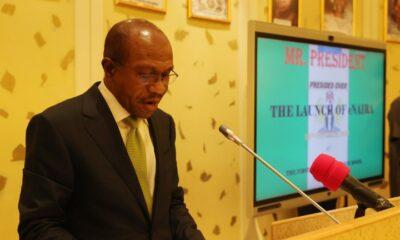- Emefiele, Bankers to Provide Insights into Economy
The Chartered Institute of Bankers of Nigeria has said the Governor, Central Bank of Nigeria, Mr Godwin Emefiele, and other stakeholders in the industry will provide insights into the economy in its upcoming annual dinner this month.
The CIBN said in a statement that being the biggest high-profile social forum organised by the institute for the banking sector, eminent personalities, including captains of industry, diplomats, top government functionaries, legislators, accomplished businessmen and other stakeholders usually gathered to interact and network under a convivial social setting.
It said, “The annual bankers’ dinner is a thought-led, socio-economic event of the industry, in which the Governor, Central Bank of Nigeria, Mr Godwin Emefiele, as the special guest of honour, will deliver a keynote address and an assessment of the current year’s realities as well as provide economic insight into the monetary policy and regulatory direction of the coming year.”
According to the statement, the Lagos State Governor, Mr Akinwunmi Ambode, as well as other state governors, are expected to be the special guests of honour and will deliver goodwill messages at the forum.
It said the Country Vice President/National President, International Federation of Women Lawyers, Mrs Inime Aguma, would propose the toast of the institute, while the Ambassador, Embassy of People’s Republic of China, Zhou Pingjian, would propose the toast of the Federal Republic of Nigeria.
The President/Chairman of Council, CIBN, Dr Uche Olowu, will be the chief host of the dinner, according to the statement.
“This year’s edition promises to be a great departure from the previous ones as the organising committee, under the chairmanship of the Group Managing Director/Chief Executive Officer, United Bank for Africa, Mr Kennedy Uzoka, is working assiduously towards ensuring a world class event,” it added.
According to the statement, other top dignitaries expected at the occasion include the Chairman, Dangote Group, Alhaji Aliko Dangote; Chairman, WAPIC Insurance Plc/former President, Nigeria Stock Exchange, Mr Aigboje Aig-Imoukhuede; Embassy of the United State of America, Ambassador Stuart Symington; Managing Director/Chief Executive, Nigeria Deposit Insurance Corporation, Alhaji Umaru Ibrahim; Chairman, Tony Elumelu Foundation/UBA Plc, Mr Tony Elumelu,; all the managing directors/chief executive offiers and chairmen of banks; Chairman, Senate Committee on Banking, Insurance and Other Financial Institutions; Chairman, House Committee on Banking and Finance among others.



 Naira4 weeks ago
Naira4 weeks ago


 Naira4 weeks ago
Naira4 weeks ago




 Naira4 weeks ago
Naira4 weeks ago




 Naira3 weeks ago
Naira3 weeks ago
 Commodities4 weeks ago
Commodities4 weeks ago


 News4 weeks ago
News4 weeks ago






 Banking Sector4 weeks ago
Banking Sector4 weeks ago
 Travel4 weeks ago
Travel4 weeks ago
















